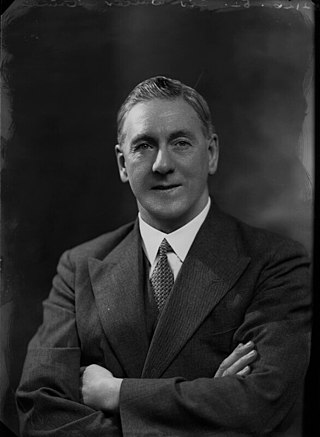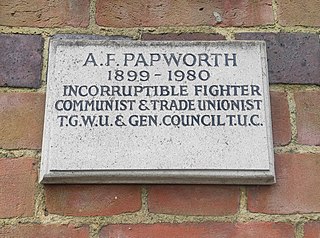James "Jock" Ritchie Haston (1913–1986) was a Trotskyist politician and General Secretary of the Revolutionary Communist Party in Great Britain.

Walter McLennan Citrine, 1st Baron Citrine, was one of the leading British and international trade unionists of the twentieth century and a notable public figure. Yet, apart from his renowned guide to the conduct of meetings, ABC of Chairmanship, he has been little spoken of in the history of the labour movement. More recently, labour historians have begun to re-assess Citrine's role.

The Association of Professional, Executive, Clerical and Computer Staff (APEX) was a British trade union which represented clerical and administrative employees.

The Electrical, Electronic, Telecommunications and Plumbing Union, known as the EETPU, was a British trade union formed in 1968 as a union for electricians and plumbers, which went through three mergers from 1992 to now be part of Unite the Union.

The Sheffield Trades and Labour Council, usually known as the Sheffield Trades Council, is a labour organisation uniting trade unionists in Sheffield.

Frank Chapple, Baron Chapple was general secretary of the Electrical, Electronic, Telecommunications and Plumbing Union (EETPU), a leading British trade union.

The Communist Party of Great Britain (CPGB) was the largest communist organisation in Britain and was founded in 1920 through a merger of several smaller Marxist groups. Many miners joined the CPGB in the 1926 general strike. In 1930, the CPGB founded the Daily Worker. In 1936, members of the party were present at the Battle of Cable Street, helping organise resistance against the British Union of Fascists. In the Spanish Civil War, the CPGB worked with the USSR to create the British Battalion of the International Brigades, which party activist Bill Alexander commanded.
Alfred Mervyn Wall was a British trade unionist and political activist.
Joseph James Vaughan was a British politician.
Jim Gardner was a Scottish trade unionist.
The Amalgamated Society of Textile Workers and Kindred Trades (ASTWKT) was a trade union representing textile workers, principally silk manufacturing, in the United Kingdom.
Alexander Gossip was a Scottish trade union leader and political activist.
James Rowan was a British trade union leader.
Alfred Ewer was a British trade unionist.
Arthur J. Walker was a British trade unionist.
Frank Leslie Haxell was a British trade unionist and communist activist.
John Thomas Byrne MBE was a Scottish trade union leader and anti-communist activist.
Frank Foulkes was a British trade unionist. One of the most prominent communist trade union leaders in the United Kingdom, he left office after being convicted of involvement in rigging an election.

Albert Frederick Papworth, often known as Pappy, was a British trade unionist. A leader of several strikes, he later became the first communist to serve on the General Council of the Trades Union Congress.
Hugh P. Bolton was a British trade union official who also served on the National Executive Committee of the Labour Party.







